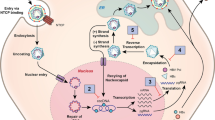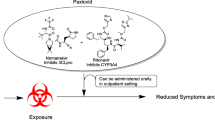Abstract
The treatment of chronic HCV has traditionally been for a fixed duration based on genotype. We now recognize that patients respond to treatment along different time lines. This appears to be secondary to various clinical, histologic, and genetic host factors. The time that it requires for a patient to become HCV RNA undetectable after initiating treatment is now recognized as one of the most important determinants of sustained virologic response. This information can be used to adjust the duration of peginterferon and ribavirin, either shorter or longer, and allows therapy to be tailored to the specific needs of each patient. This concept is referred to as response-guided therapy.


Similar content being viewed by others
References
Papers of particular interest, published recently, have been highlighted as: • Of importance •• Of major importance
Fried MW, Shiffman ML, Reddy KR, et al.: Combination of peginterferon alfa-2a (40 kd) plus ribavirin in patients with chronic hepatitis C virus infection. N Engl J Med 2002; 347:975–982.
Manns MP, McHutchinson JG, Gordon SC, et al.: Peginterferon-alfa-2b plus ribavirin compared with interferon alfa-2b plus ribavirin for initial treatment of chronic hepatitis C: a randomized trial. Lancet 2001; 358:958–965.
• McHutchison JG, Lawitz EJ, Shiffman ML, et al.: Peginterferon alfa-2b or alfa-2a with ribavirin for treatment of hepatitis C infection. N Engl J Med 2009; 361:580–593. This article describes the largest study ever conducted comparing two types of peginterferon and a lower dose of peginterferon α-2b.
Hadziyannis SJ, Sette H Jr, Morgan TR, et al.: Peginterferon-alfa 2a and ribavirin combination therapy in chronic hepatitis C: a randomized study of treatment duration and ribavirin dose. Ann Intern Med 2004; 140:346–355.
Legrand-Abravanel F, Nicot F, Boulestin A, et al.: Pegylated interferon and ribavirin therapy for chronic hepatitis C virus genotype 4 infection. J Med Virol. 2005; 77:66–9.
Conjeevaram HS, Fried MW, Jeffers LJ, et al.: Peginterferon and ribavirin treatment in African American and Caucasian American patients with hepatitis C genotype 1. Gastroenterology. 2006; 131:470–477.
Muir AJ, Bornstein JD, Killenberg PG: Peginterferon alfa-2b and ribavirin for the treatment of chronic hepatitis C in blacks and non-Hispanic whites. N Engl J Med. 2004; 350:2265–2271.
Shiffman ML, Mihas AA, Millwala F, et al.: Treatment of Chronic Hepatitis C Virus in African Americans With Genotypes 2 and 3. Am J Gastroenterol. 2007; 102:1–6.
Rodriguez-Torres M, Jeffers LJ, Sheikh MY, et al.: Peginterferon alfa-2a and ribavirin in Latino and non-Latino whites with hepatitis C. Engl J Med. 2009; 360:257–267.
•• Ge D, Fellay J, Thompson AJ, et al.: Genetic variation in IL28B predicts hepatitis C treatment-induced viral clearance. Nature. 2009; 461:399-401. This study demonstrates the impact of the IL28B gene on sustained response and the distribution of this gene across various racial and ethnic groups.
Romero-Gomez M, Del Mar Viloria M, Andrade RJ, et al.: Insulin resistance impairs sustained response rate to peginterferon plus ribavirin in chronic hepatitis C patients. Gastroenterology 2005;128:636–641
Zeuzem S, Rizzetto M, Ferenci P, Shiffman ML: Management of hepatitis C virus genotype 2 or 3 infection: treatment optimization on the basis of virological response. Antivir Ther. 2009; 14:143–154.
Bronowicki JP, Ouzan D, Asselah T, et al.: Effect of ribavirin in genotype 1 patients with hepatitis C responding to pegylated interferon alfa-2a plus ribavirin. Gastroenterology 2006; 131:1040–1048.
Shiffman ML, Ghany MG, Morgan TR, et al.: Impact of reducing peginterferon alfa-2a and ribavirin dose during retreatment in patients with chronic hepatitis C. Gastroenterology 2007; 132:103–112.
McHutchison JG, Manns M, Patel K, et al.: Adherence to combination therapy enhances sustained response in genotype-1-infected patients with chronic hepatitis C. Gastroenterology 2002; 123:1061–1069.
Ferenci P, Fried MW, Shiffman ML, et al.: Predicting sustained virological responses in chronic hepatitis C patients treated with peginterferon alfa-2a (40KD)/ribavirin. J Hepatol 2005; 43:453–471.
Ferenci P, Laferl H, Scherzer TM, et al.: Peginterferon alfa-2a and ribavirin for 24 weeks in hepatitis C type 1 and 4 patients with rapid virological response. Gastroenterology. 2008; 135:451–458.
Berg T, von Wagner M, Nasser S, et al.: Extended treatment duration for hepatitis C virus type 1: comparing 48 versus 72 weeks of peginterferon-alfa-2a plus ribavirin. Gastroenterology. 2006; 130:1086–1097.
Berg T: Tailored treatment for hepatitis C. Clin Liver Dis. 2008; 12:507–528.
Mangia A, Minerva N, Bacca D, et al.: Individualized treatment duration for hepatitis C genotype 1 patients: A randomized controlled trial. Hepatology. 2008; 47:43–50.
Sánchez-Tapias JM, Diago M, Escartín P, et al.: Peginterferon-alfa2a plus ribavirin for 48 versus 72 weeks in patients with detectable hepatitis C virus RNA at week 4 of treatment. Gastroenterology. 2006; 131:451–460.
Pearlman BL, Ehleben C, Saifee S: Treatment extension to 72 weeks of peginterferon and ribavirin in hepatitis c genotype 1-infected slow responders. Hepatology. 2007; 46:1688–1694.
Shiffman ML, Chung RT, Hamzeh FM: Time to HCV RNA undetectability supersedes baseline factors in predicting SVR in patients with HCV genotype 1. J Hepatology 2008; 48 (suppl 2):S313.
Jensen DM, Morgan TR, Marcellin P, et al.: Early identification of HCV genotype 1 patients responding to 24 weeks peginterferon alpha-2a (40 kd)/ribavirin therapy. Hepatology. 2006; 43:954–960.
Ferenci P, Laferl H, Scherzer TM, et al.: Peginterferon alfa-2a/ribavirin for 48 or 72 weeks in hepatitis C genotypes 1 and 4 patients with slow virologic response. Gastroenterology. 2010; 138:503–512.
Mangia A, Santoro R, Minerva N, et al.: Peginterferon alfa-2b and ribavirin for 12 vs. 24 weeks in HCV genotype 2 or 3. N Engl J Med. 2005; 352:2609–2017.
von Wagner M, Huber M, Berg T, et al.: Peginterferon-alpha-2a (40KD) and ribavirin for 16 or 24 weeks in patients with genotype 2 or 3 chronic hepatitis C. Gastroenterology. 2005; 129:522–527.
Dalgard O, Bjøro K, Hellum KB, et al.: Treatment with pegylated interferon and ribavarin in HCV infection with genotype 2 or 3 for 14 weeks: a pilot study. Hepatology. 2004; 40:1260–1265.
Yu ML, Dai CY, Huang JF, et al.: A randomised study of peginterferon and ribavirin for 16 versus 24 weeks in patients with genotype 2 chronic hepatitis C. Gut. 2007; 56:553–559.
• Shiffman ML, Suter F, Bacon BR, et al.: Peginterferon alfa-2a and ribavirin for 16 or 24 weeks in HCV genotype 2 or 3. N Engl J Med. 2007; 357:124–134. This article describes the largest study ever conducted evaluating the impact of a shorter duration of therapy in patients with chronic HCV genotypes 2 and 3.
Lagging M, Langeland N, Pedersen C, et al.; NORDynamIC Study Group: Randomized comparison of 12 or 24 weeks of peginterferon alpha-2a and ribavirin in chronic hepatitis C virus genotype 2/3 infection. Hepatology. 2008; 47:1837–1845.
Dalgard O, Bjøro K, Ring-Larsen H, et al.: Pegylated interferon alfa and ribavirin for 14 versus 24 weeks in patients with hepatitis C virus genotype 2 or 3 and rapid virological response. Hepatology. 2008; 47:35–42.
Willems B, Hadziyannis SJ, Morgan TR, et al.: Should treatment with peginterferon plus ribavirin be intensified in patients with HCV genotype 2/3 without a rapid virological response? J Hepatol 2007; 46:S6.
•• Thompson AJ, Muir AJ, Sulkowski MS, et al.: IL28B polymorphism improves viral kinetics and is the strongest pre-treatment predictor of SVR in HCV-1 patients. Gastroenterology. 2010; 139:120–129. This study shows the impact of the IL28B gene on virologic response patterns and the impact of this on SVR.
• McHutchison JG, Manns MP, Muir AJ, et al.: Telaprevir for previously treated chronic HCV infection. N Engl J Med. 2010; 362:1292–1303. This article describes a phase 2 clinical trial showing the impact of retreating prior HCV treatment failures to peginterferon and ribavirin with peginterferon, ribavirin, and telaprevir.
Bacon BR, Gordon SC, Lawitz E, et al.: HCV respond-2 final results: High sustained virologic response among genotype 1 previous non-responders and relapsers to peginterferon/ribavirin when retreated with boceprevir plus peginterferon alfa-2b/ribavirin. Hepatology 2010; 52 (suppl);430A.
Jensen DM, Marcellin P, Freilich B, et al.: Re-treatment of patients with chronic hepatitis C who do not respond to peginterferon-alpha2b: a randomized trial. Ann Intern Med. 2009; 150:528–540.
Bacon BR, Shiffman ML, Mendes F, et al.: Retreating chronic hepatitis C with daily interferon alfacon-1/ribavirin after nonresponse to pegylated interferon/ribavirin: DIRECT results. Hepatology. 2009; 49:1838–1846.
Shiffman ML: Optimizing the current therapy for chronic hepatitis C virus: Peginterferon and ribavirin dosing and the utility of growth factors. Clin Liver Dis 2008; 12:487–505.
• Shiffman ML, Salvatori J, Hubbard S, et al.: Treatment of chronic hepatitis C virus genotype 1 with peginterferon, ribavirin, and epoetin alpha. Hepatology. 2007; 46:371–379. The only prospective, randomized, controlled trial conducted to date to evaluate the impact of epoetin α versus dose modification on sustained virologic response in patients with chronic HCV being treated with peginterferon and ribavirin.
•• Sulkowski MS, Shiffman ML, Afdhal NH, et al.: HCV treatment-related anemia is associated with higher sustained virologic response rate. Gastroenterology. 2010; 139:1602–1611. This article presents a retrospective analysis from a large clinical trial evaluating the impact of dose reduction to epoetin α for treatment of anemia in patients with chronic HCV who are receiving peginterferon and ribavirin.
Conflicts of interest
M. Shiffman—consultancies for Hoffman LaRoche, Human Genome Sciences, and Exalenz; grants from Conatus, Genentech, Zymogenetics, Globeimmune, Gilead, Vertex, Tibotec, Romark, Biolex, Bristol-Myers Squibb, Idenix, and Valeant; honoraria from Genentech, Merck, Zymogenetics, Gilead, Bristol-Myers Squibb, and Novartis; speakers’ bureaus payments from Genentech, Merck, Bristol-Myers Squibb, and Gilead; expense reimbursement from Romark, Genentech, and Merck; data safety monitoring boards for HCV products for Abbott and Anadys.
Author information
Authors and Affiliations
Corresponding author
Rights and permissions
About this article
Cite this article
Shiffman, M.L. HCV Response-Guided Therapy: Should Treatment Length Be Shortened or Extended?. Curr Hepatitis Rep 10, 4–10 (2011). https://doi.org/10.1007/s11901-010-0077-8
Published:
Issue Date:
DOI: https://doi.org/10.1007/s11901-010-0077-8




